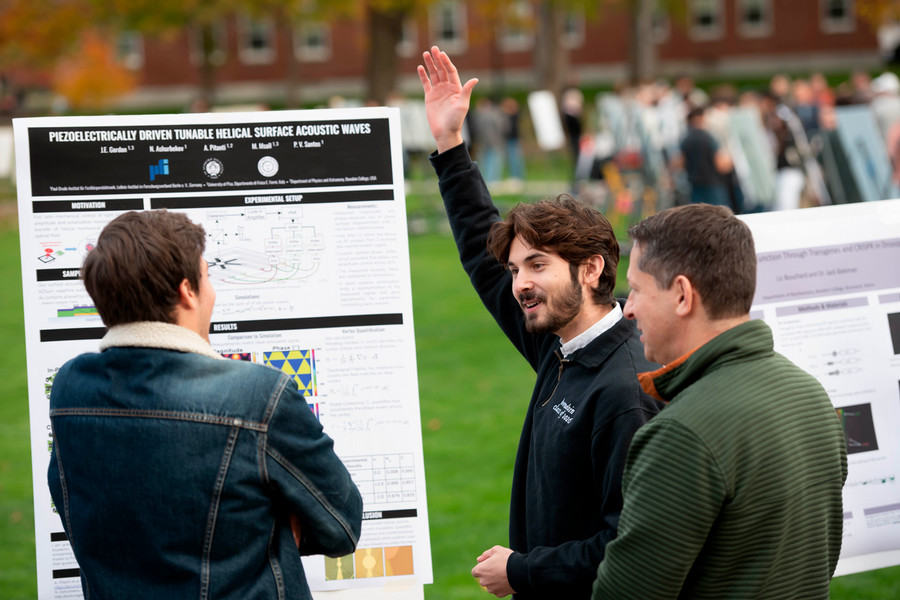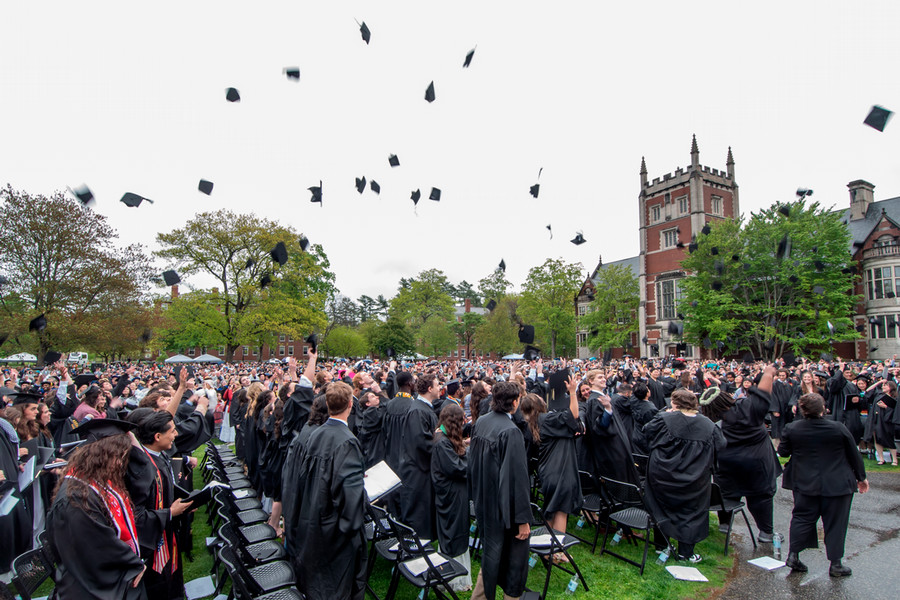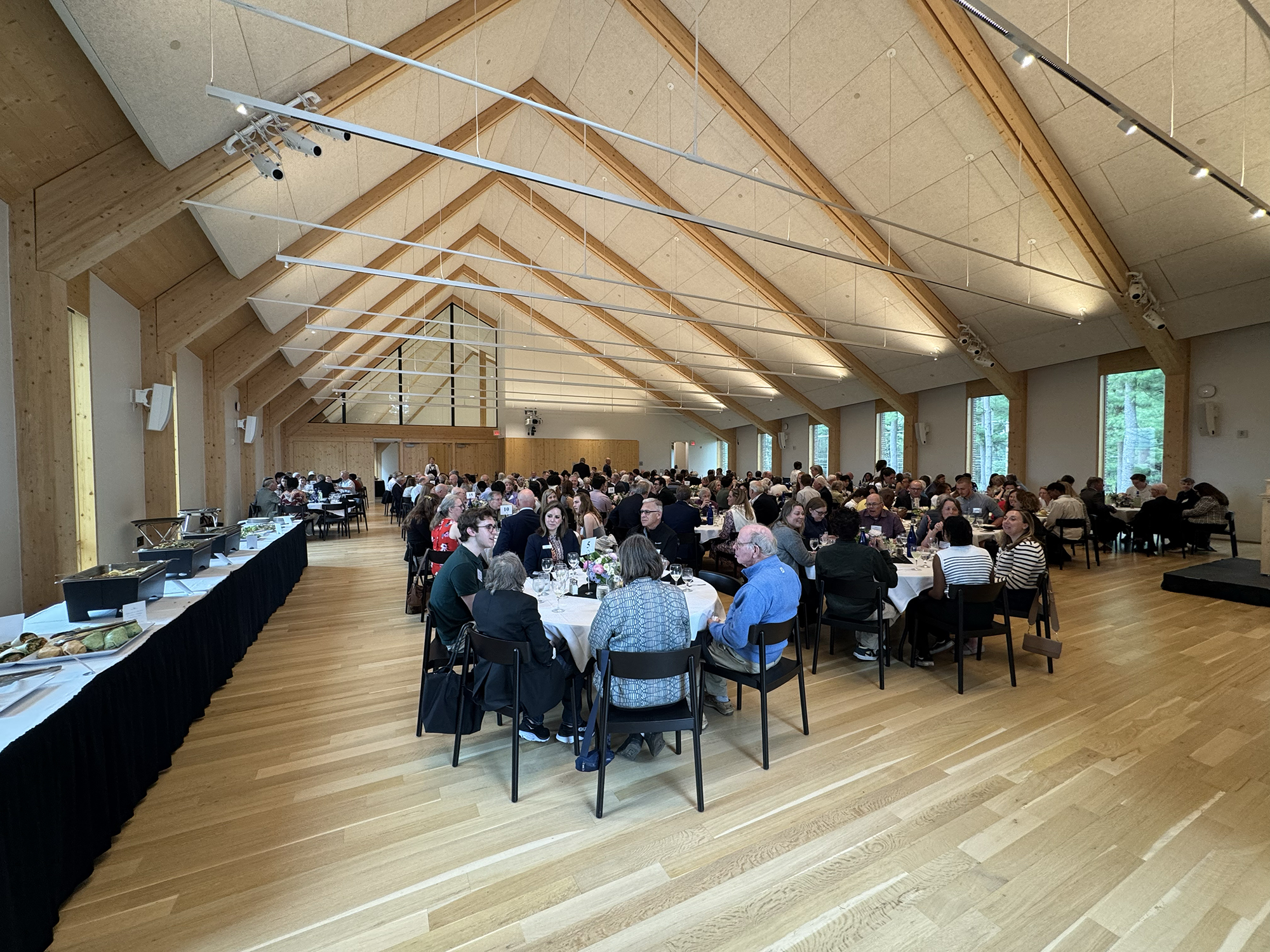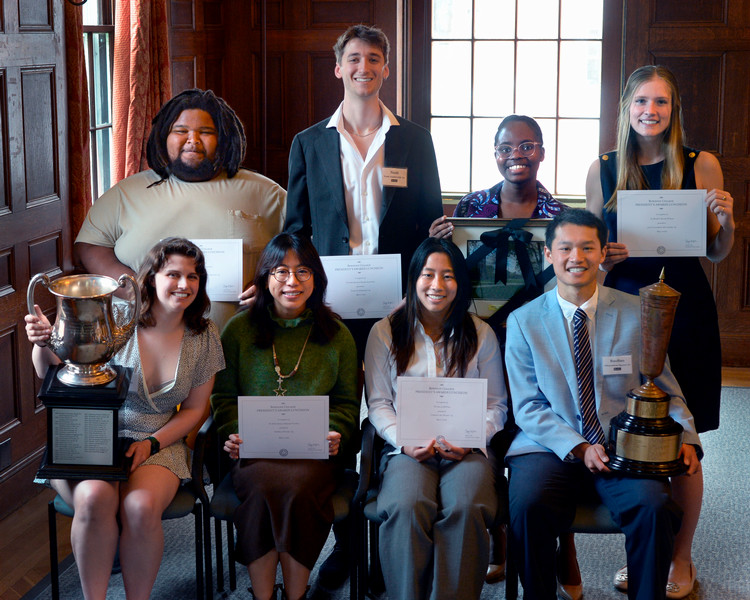Sarah and James Bowdoin Day Student Speech 2023
By Bowdoin News"Embracing Mistakes and Celebrating Progress," by Hailey Ryan '26
I want to start by congratulating everyone here today (albeit remotely) for this academic accomplishment. I recognize the amount of diligence, care, and focus it takes to reach this kind of achievement. While we all have different ways of pushing ourselves, I imagine that we share some of the same challenges when it comes to balancing our desire to perform well with our desire to grow in new directions.
Many people since covid have realized that grades are not altogether indicative of one’s worth and potential. While I strongly agree with this message, I believe that most of us understand it by now. So with this new realization - both in ourselves as students and in professors alike - I want to encourage us all to take it one step further. Leaving behind the pressure of grades, I urge us to take chances, make mistakes, and learn through progress instead of perfection.
This past year, I started physical therapy for my back. I was thrilled for this opportunity - less pain, getting stronger. But I soon realized I was in for something much more than massages and easy stretches. See, the muscle weaknesses I have create a barrier between my thoughts and my movements. My physical therapist would show me exercises, like moving my big toe up and down without scrunching my little toes; and it looked easy enough. But the second I tried them, I realized that my body just couldn’t catch up to the intentions in my brain. It’s such a strange feeling - being so out of control. As a Type A person, I’ve always craved a sense of control. In my golf swing, in my grip on a pencil, in my overly meticulous reading of emails before sending them, it’s so apparent.
Now I’m learning that sometimes I have to let go to gain a deeper sense of control instead of this artificial control with compensations and superstitions. I have to let myself fail in order to let my brain learn. The only way I could improve my brain-body connection was by trying again and again and again and again. There were so many times I couldn’t do things perfectly. But the more I tried and the more I corrected as I went along, the more connection I felt. As my physical therapist observed me doing my exercises, he urged me to do two general things: 1) slow down, and 2) let yourself mess up - that’s how your brain learns to do it right. I think all of us here today can learn from embracing this approach more often, even if it sounds like something we’ve heard before or something that we might believe works for other people, but not for us.
Letting yourself mess up doesn’t mean you let your grades slip, just like messing up an exercise didn’t mean I should just keep doing it wrong and be okay with that. Letting yourself mess up means being kind to yourself when you can’t get something right away or when an assignment doesn’t go perfectly even though you tried your best. It means you might get a question wrong when you participate in class, but the professor or classmates correct you and you then digest it more deeply. It might mean going to a professor because you are just so stuck and can’t figure out how to get started on a problem - but then using their advice to approach other problems in the future. Messing up is inevitable, and it’s how we respond to messing up that matters. We learn more deeply when we fail and keep trying. It’s scary, so often we fall back to where we are comfortable. But I urge all of you - just as I do myself - to take risks and be scared. At Bowdoin, there are so many opportunities to do so. We can take a class we’ve always wanted to try even if we think it’d be hard or we can take a class we know nothing about. We can apply to internships we think might be a reach. We can study abroad. We can get personal help from professors even if we fear being seen as dumb. We have such kind and caring professors here. I’ve been nervous to go to office hours almost every time because I’m a shy perfectionist who doesn’t always like asking for help (sometimes I don’t even know how or what to ask) - but every single time I’ve gone it has been a great and rewarding experience. They help me formulate questions if I’m just unsure, they help clarify big picture ideas, and, most importantly, they get to know me. They understand that I’m just a human being trying my best to learn cool things and do well in their class. They see past the high achiever and see the person inside that is reflective, curious, multidimensional, and incredibly interesting. I’m sure most of you have had similar experiences - because asking for help is a huge skill that leads to success, and Bowdoin knows how to foster this type of community.
Another important skill is slowing down. High academic achievers have a tendency to live in the fast lane, with all the pressure built up inside to keep succeeding. I tend to speed up when I’m nervous or afraid that I’m doing something wrong - like I might as well get it over with instead of trying to fix it. When I slowed down with my exercises, I was able to use each controlled breath to guide me so that I could deeply feel the specific muscles working. At first, I would lose my balance or not get an exercise done as smoothly. But this strain that came with slowing down was essential to activate the right muscles and foster a deeper mind-body connection. My courses thus far at Bowdoin have demanded this diligence. When presented with page-long scenarios about mutations as biology test questions, I couldn’t rush through the descriptions and just spit out facts I’d learned. I had to pick out the important pieces of information, break down confusing sentences, and combine it all into a cohesive explanation for the biological issue. Like hitting every correct muscle, I had to hit every step of the biological mechanism to truly solve the problem. It’s tempting to speed up, maybe with a problem set or when you’re answering a question in class - just get it done and hope it’s good enough. But slowing down, reevaluating, and thinking deeply helps us solve problems in any class in more profound ways.
So take a second now, and realize what you’ve accomplished - this is a big deal, whether you feel like you’re used to it or you’ve never felt fully appreciated. I hope you learn that when you slow down, you can still accomplish great things - probably even greater things, and be happier as you do it. Everyone here is a hardworking, passionate individual in an environment that ensures you get the care and preparation you need to do whatever you want to do in life. I believe in all of us and our ability to slow down and learn from messing up.
This speech is one step closer to me achieving this goal - I took a risk by submitting one and I’ve tried my best to not rush my way through these words. Congratulations to all of you and I wish everyone a wonderful rest of their semester and school year!



